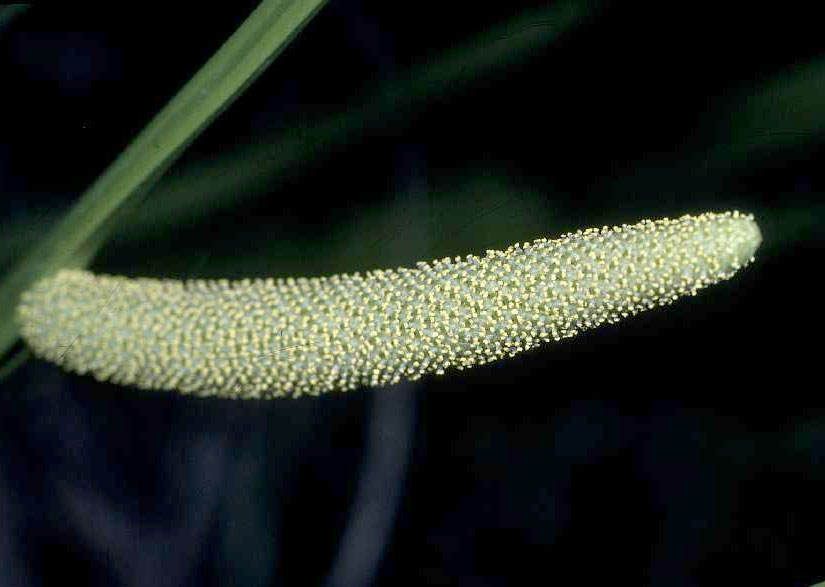Common Names and Other Names:
- Sweet Flag
- Calamus
- Muskrat Root
- Bitterroot
- Myrtle Flag
- Sweet Cane
- Vacha (in Ayurvedic medicine)
Where Does It Occur:
Acorus calamus is a perennial herb native to:
- Asia: India, China, Japan, Siberia
- Europe: Naturalized in many parts, especially in wetlands
- North America: Introduced and naturalized, found in the eastern United States and Canada
It typically grows in marshes, swamps, along riverbanks, and wetlands. The plant prefers shallow, slow-moving water and muddy soils.
Basic Ingredients (Constituents):
Sweet Flag contains several bioactive compounds:
- Volatile Oils:
- α-Asarone
- β-Asarone (Note: β-Asarone is a concern due to potential toxicity)
- Calamenone
- Eugenol
- Phenylpropanoids:
- Safrole
- Alkaloids
- Sesquiterpenes
- Tannins
- Mucilage
- Glycosides
These constituents contribute to the plant’s aromatic properties and medicinal effects, such as antispasmodic, carminative, sedative, and digestive actions.
Most Commonly Used For Treatment Of:
- Digestive Disorders:
- Dyspepsia: Alleviates indigestion and discomfort.
- Flatulence: Reduces gas and bloating.
- Loss of Appetite: Stimulates appetite.
- Neurological Conditions:
- Anxiety and Stress: Acts as a mild sedative.
- Memory Enhancement: Traditionally used to improve memory and cognition.
- Respiratory Issues:
- Coughs and Bronchitis: Helps in clearing mucus.
- Skin Conditions:
- Wound Healing: Applied topically to aid healing.
- Fever Reduction:
- Induces sweating to help reduce fevers.
- Anti-inflammatory Effects:
- Reduces inflammation in joints and muscles.
- Traditional Uses in Ayurveda:
- Vacha: Used for speech disorders, enhancing intellect, and as a rejuvenator.
Side Effects:
Potential Toxicity:
- β-Asarone Content:
- Carcinogenic Potential: Studies in rodents have shown that β-asarone may be carcinogenic.
- Regulatory Status: Due to safety concerns, products containing β-asarone are restricted or banned in some countries, including the United States and Canada.
Possible Side Effects Include:
- Gastrointestinal Issues:
- Nausea
- Vomiting
- Diarrhea
- Neurological Symptoms:
- Excessive sedation
- Dizziness
- Hallucinations (in high doses)
- Heart Rhythm Disturbances:
- Potential for arrhythmias with excessive use.
- Skin Irritation:
- Allergic reactions upon topical application.
Available Forms in the Market:
- Dried Rhizomes (Roots):
- Used to make teas, decoctions, or powders.
- Powdered Form:
- Incorporated into capsules or tablets.
- Essential Oil:
- Used in aromatherapy (Note: Use with caution due to β-asarone content).
- Extracts and Tinctures:
- Alcohol-based extracts for internal use.
- Topical Preparations:
- Ointments or creams for external application.
Important Note: Due to safety concerns, the sale of Acorus calamus products may be regulated or prohibited in certain regions. Always ensure products comply with local regulations.
Research and Results:
- Cognitive Enhancement:
- Study: “Memory-enhancing activity of Acorus calamus in rodents.”
- Findings: Indicated potential benefits in improving memory and learning in animal models.
- Link: Journal of Medicinal Food
- Anticonvulsant Activity:
- Study: “Anticonvulsant effects of Acorus calamus root extracts.”
- Findings: Showed protective effects against induced seizures in animals.
- Link: Phytotherapy Research
- Antimicrobial Properties:
- Study: “Antimicrobial activity of Acorus calamus.”
- Findings: Demonstrated inhibitory effects against certain bacteria and fungi.
- Link: Indian Journal of Pharmacology
- Anti-Inflammatory Effects:
- Study: “Anti-inflammatory activity of Acorus calamus rhizome.”
- Findings: Showed reduction in inflammation markers in animal models.
- Link: Journal of Ethnopharmacology
Caution on β-Asarone:
- Toxicological Concerns:
- Study: “Toxic effects of β-asarone in rodents.”
- Findings: Chronic exposure led to carcinogenic effects in rats.
- Link: Food and Chemical Toxicology
Precautions:
- Regulatory Status:
- United States: FDA prohibits the use of calamus and its derivatives in food due to β-asarone’s carcinogenic potential.
- European Union: Similar restrictions apply.
- Pregnancy and Breastfeeding:
- Avoid Use: Potential uterine stimulant; may cause miscarriage.
- Children:
- Not Recommended: Safety has not been established.
- Dosage Control:
- Use with Caution: Only under the guidance of a qualified healthcare provider.
- Medication Interactions:
- Sedatives: May enhance effects of CNS depressants.
- Anticholinergic Drugs: Potential interactions; consult a healthcare provider.
- Medical Conditions:
- Heart Disorders: Use cautiously due to potential effects on heart rhythm.
- Seizure Disorders: May lower seizure threshold.
- Allergies:
- Individuals allergic to Acorus species should avoid use.
- Contamination Risk:
- Quality Assurance: Ensure products are from reputable sources and tested for β-asarone content.
Conclusion:
Acorus calamus (Sweet Flag) has a long history in traditional medicine systems like Ayurveda and Traditional Chinese Medicine. It’s been used for digestive issues, cognitive enhancement, and respiratory conditions. However, modern research has raised concerns about the safety of β-asarone, a compound found in the plant, due to its potential carcinogenic and toxic effects.
Recommendations:
- Consult a Healthcare Professional: Before using products containing Acorus calamus.
- Regulatory Compliance: Be aware of local regulations regarding its use.
- Alternative Options: Consider other herbs with similar benefits but established safety profiles.
